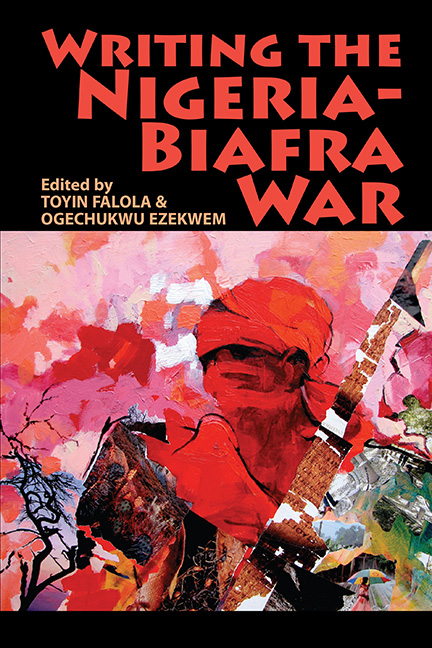Book contents
- Frontmatter
- Contents
- Notes on Contributors
- List of Abbreviations
- Timeline
- Map of Biafra 30 May 1967 – 1 May 1969
- 1 Scholarly Trends, Issues, and Themes: Introduction
- Part I On The History Of The Nigeria-Biafra War
- Part II Critical Debates On The Nigerian Crisis
- Part III The War In Fiction, Memoir, And Imagination
- Part IV Locating Gender In Nigeria-Biafra War Literature
- Select Bibliography
- Index
6 - Beyond the Blame Game: Theorizing the Nigeria-Biafra War
Published online by Cambridge University Press: 17 June 2021
- Frontmatter
- Contents
- Notes on Contributors
- List of Abbreviations
- Timeline
- Map of Biafra 30 May 1967 – 1 May 1969
- 1 Scholarly Trends, Issues, and Themes: Introduction
- Part I On The History Of The Nigeria-Biafra War
- Part II Critical Debates On The Nigerian Crisis
- Part III The War In Fiction, Memoir, And Imagination
- Part IV Locating Gender In Nigeria-Biafra War Literature
- Select Bibliography
- Index
Summary
Introduction
On May 30, 1967, when Colonel Emeka Odumegwu Ojukwu, the head of the Eastern Region, declared the independent Republic of Biafra, no-one knew that the resultant war would lead to the death, mostly by starvation, of about a million people. The war, which almost tore Nigeria apart, began effectively in July, almost seven years after Nigeria’s independence from Great Britain. The Biafran forces recorded early successes, but Nigerian troops immediately pushed them back. No sooner had the war started than photographs of starving children with huge distended stomachs adorned television screens and the front pages of newspapers.
As studies have shown, the circumstances that led to the war could not be divorced from the spate of violence that erupted between Hausa and Igbos in Northern Nigeria following the first military coup of 1966. The violence prompted thousands of Igbos to flee Northern Nigeria. Nigeria's military government failed to guarantee security for them and, on May 30, 1967, Lieutenant Colonel Odumegwu Ojukwu, with the active support of other non-Igbo representatives in Eastern Nigeria, declared secession and established the Republic of Biafra.
All diplomatic efforts to reunite the Eastern Region with the rest of Nigeria failed, and in July 1967 war broke out between Nigeria and Biafra. As already noted, an initial success of Ojukwu's ragtag forces was promptly pushed back, and the forces eventually capitulated under superior military strength of the Nigerian state. On January 11, 1970, the Nigerian forces captured the provincial capital of Owerri, one of the last Biafran strongholds. Ojukwu, the leader of the insurgents, fled to neighboring Ivory Coast. Four days later, Biafra surrendered and the war ended. The civil war not only came close to tearing Nigeria apart but also provoked passions in different parts of the world, most especially the United States of America and Britain.
In addition to about 30,000 Igbos who were killed in Northern Nigeria before the war, more than 1 million other Igbos died in the war. About another 1 million were either internally displaced within Eastern Nigeria or became refugees in neighboring countries. Most of the wardead were civilians, with a large number being women and children.
Over 30 years after the war, the ghost of Biafra still haunts Nigeria, as the Igbos continue to claim marginalization and humiliation from the war. Additionally, wounded veterans are daily seen on wheelchairs alongside main roads in Enugu, begging for alms.
- Type
- Chapter
- Information
- Writing the Nigeria-Biafra War , pp. 111 - 129Publisher: Boydell & BrewerPrint publication year: 2016



